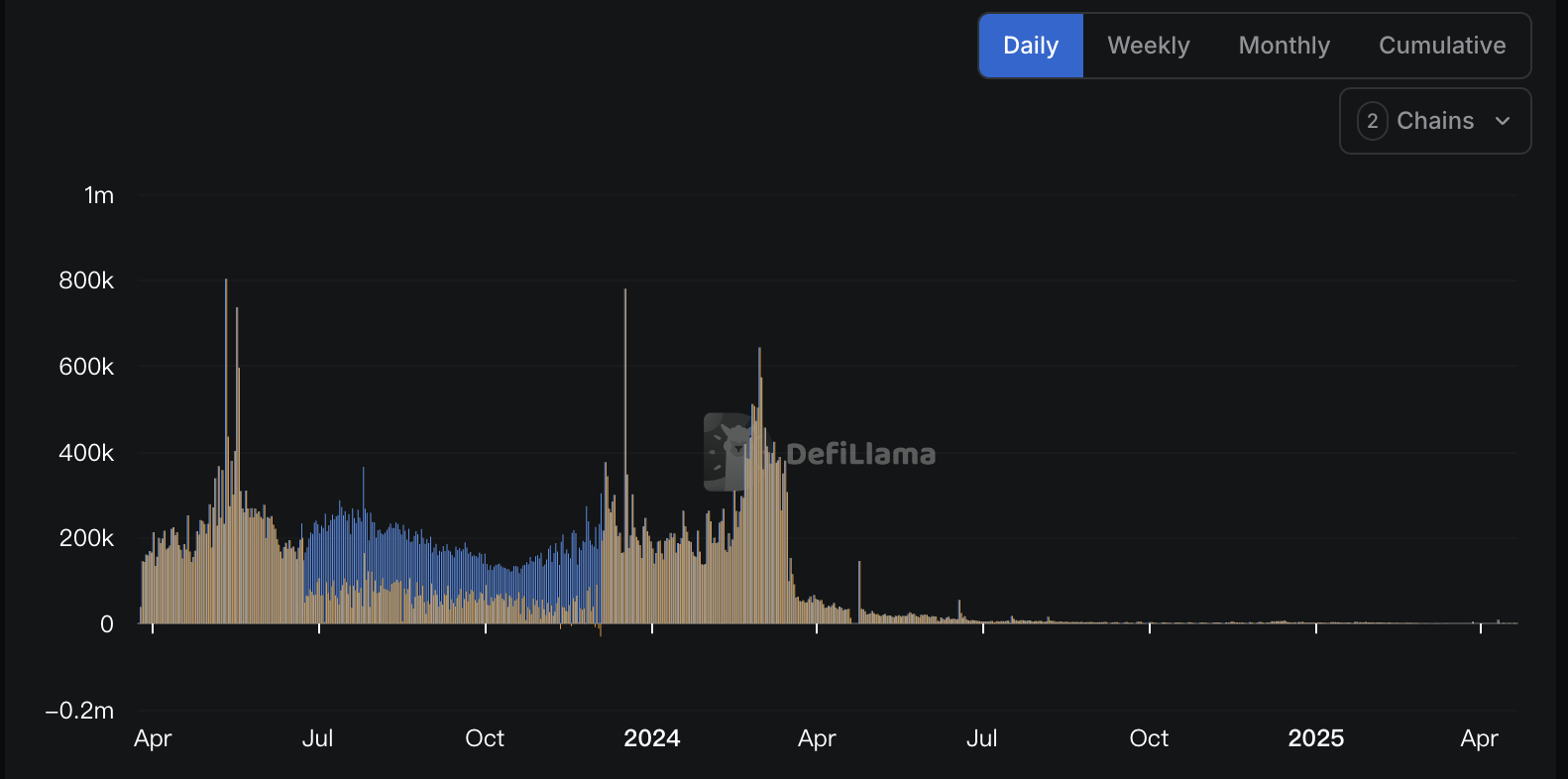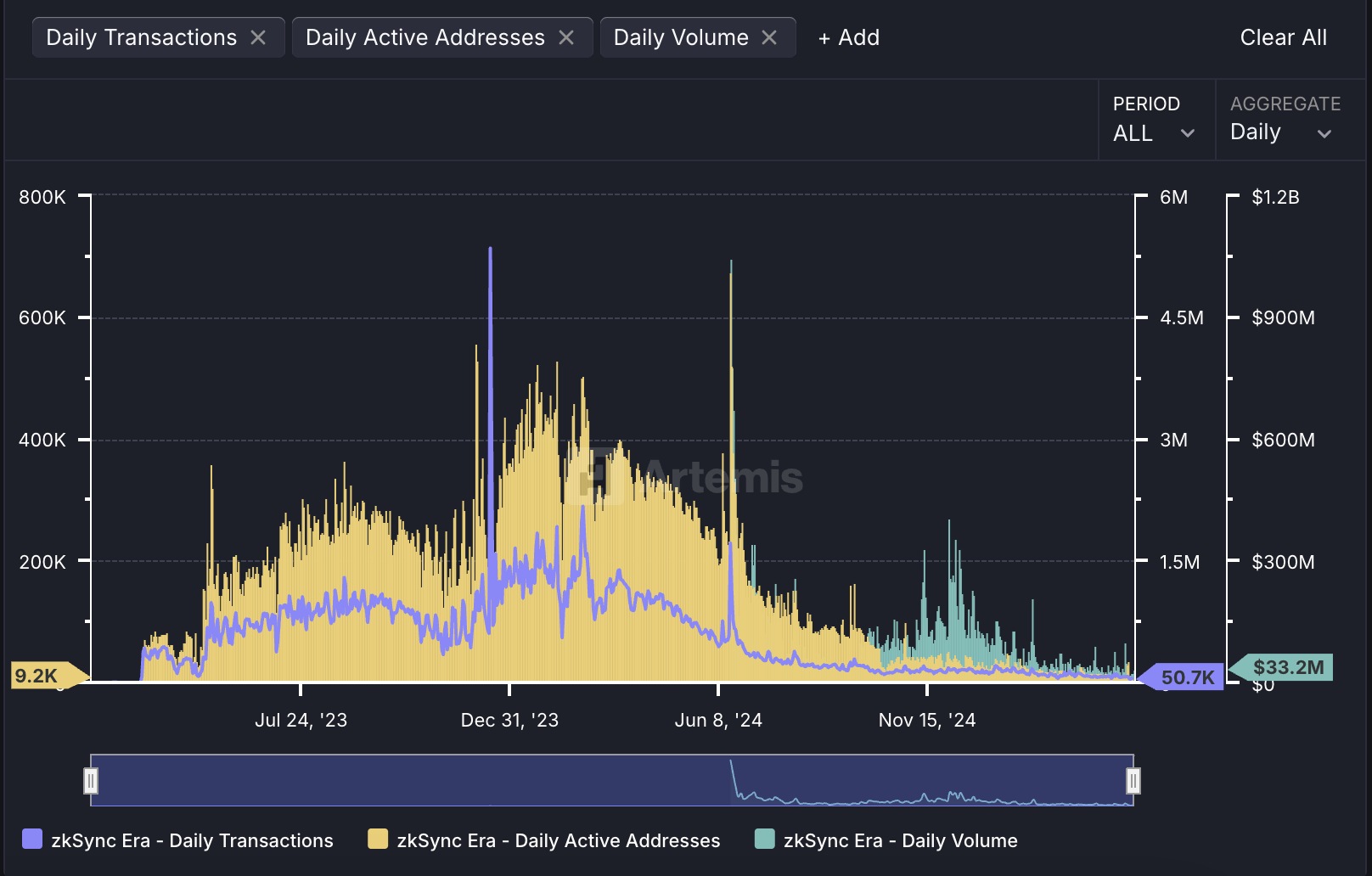ZKSync in the vortex of crisis: developer Matter Labs is sued for stealing core technology, currency theft storm and ecological shrinkage are under pressure

Reprinted from panewslab
04/23/2025·24DAuthor: Nancy, PANews
One wave has not yet settled, and another wave has risen again. The recent trust crisis caused by the hacked incident of the L2 project ZKsync due to the airdrop distribution contract has not yet subsided, and its developer Matter Labs is involved in legal disputes and public opinion vortex for suspected intellectual property theft.
Matter Labs is sued by BANKEX, accused of
misappropriating technology and taking away the core development team
On March 19 this year, Igor Khmel, CEO of digital asset banking platform BANKEX and its affiliated entities filed a lawsuit in the New York Supreme Court, accusing former employees Alexandr Vlasov and Petr Korolev of misappropriating BANKEX core technology during their tenure, privately founded a competitive company Matter Labs, and obtained more than $450 million in venture capital.
According to LinkedIn data, Vlasov is currently the R&D director of Matter Labs. He has been in office for 6 years and 8 months. During this period, he is mainly responsible for preparing for the release of Plasma on the Ethereum main network and developing a GPU-based zkSNARK prover for the next generation of Plasma protocol. Prior to this, Vlasov served as the chief research scientist of the BANKEX Foundation from March 2018 to January 2019, leading the implementation of Plasma and developed a complete set of tools including back-end systems and smart contracts to support the actual operation of Plasma. Another key figure, Korolev, is currently the founder of blockchain security company OXORIO, who served as co-founder and head of operations at Matter Labs from August 2018 to January 2020. Prior to joining Matter Labs, Korolev was CEO and co-founder of the BANKEX Foundation, leading the establishment of the institution's R&D system, and Plasma R&D was listed as one of the four core projects it participated in and promoted during this tenure.
The complaint disclosed that as early as 2017, Ethereum co-founder Vitalik Buterin found BANKEX and commissioned it to develop "Plasma"-related operating software. At that time, Plasma was regarded as a key technology that could improve Ethereum's scalability. Vlasov and Korolev, who were BANKEX employees at that time, led the specific development of the project. BANKEX provided financial, human and community resource support for this, and the relevant results were open sourced on the GitHub platform and unveiled at many developer conferences, which was also publicly recognized by Vitalik.
However, according to the litigation documents, in February 2018, Vlasov created a new account called "Matter Labs" on GitHub while still being a BANKEX employee, and uploaded a code base that was almost exactly the same as BANKEX already has "Plasma Contract". It was not signed by BANKEX and did not comply with the original Apache/MIT license requirements. Vlasov subsequently released the "Web3Swift Library" in his personal name, which constituted a clear conflict of competition and intellectual property violation.
On August 13, 2018, Vlasov and Korolev suddenly announced their resignation, without notice or arrangement for technical handover in advance, and publicly released the Matter Labs white paper on GitHub within a week, introducing the Plasma expansion architecture in detail, but deliberately avoiding its technology from BANKEX. The white paper not only reuses the code structure and algorithm design previously submitted by BANKEX, but also quotes their achievements in "ETHWaterloo Hackathon" and Vitalik's recognition, but does not state that the results were obtained under the name of BANKEX. At the same time, the white paper also repackaged it using Plasma technology demo, illustration and algorithm details that BANKEX once published on GitHub as the original result of Matter Labs.
What's more serious is that after the two left the company, they quickly induced BANKEX key engineers to "change jobs". Matter Labs' initial technical team was almost composed of former BANKEX core members, including senior engineers such as foundation COO Sergey Korolev (Korolev's brother), Anton Nezlobin, Georgy Fesenko and Konstantin Panarin. Even on the GitHub project page, the official BANKEX project was changed to a prompt: "web3swift development has been frozen, welcome to use [matter-labs/web3swift]", and openly use BANKEX's influence to divert users.
With the loss of technology and team core, BANKEX quickly fell into trouble. In mid-2018, the company's valuation reached US$530 million and its annual revenue was US$6.5 million, but it shrunk to US$200 million by the end of the year. And because the core technology and team were taken to the point of being unable to obtain financing, BANKEX was completely suspended in 2019. Khmel once sought emergency funding from Vitalik from the Ethereum Foundation, but received no response. In the fifth round of funding list released by Ethereum Foundation in February 2019, Matter Labs ranked first, and BANKEX was completely excluded.
The complaint also states that Matter Labs CEO Alex Gluchowski, Placeholder partner and former director Chris Burniske, as well as investment institutions Dragonfly and Placeholder Capital are also suspected of knowingly or participating in the misappropriation of the technology and become one of the defendants.
Facing the allegations, Matter Labs said in response to Coindesk that the allegations were unfounded. The core of the complaint is that Matter Labs builds ZKsync based on the code developed by BANKEX, which is completely untrue. ZKsync is an original technology and is not based on or derived from any code from BANKEX. “We are confident in our work’s integrity and look forward to clarifying this baseless allegation in court after receiving a formal summons.”
Reputation has been hit hard, and **ecological activity has shrunk
significantly**
In fact, this is not the first time that Matter Labs has been criticized for "plagiarism". As early as 2023, Polygon, also a ZK-based company, publicly criticized zkSync for copying its open source code without permission and using misleading languages in its release. In response, zkSync responded that only about 5% of the Boojum module code is based on Polygon's Plonky2 library and clearly marked the source on GitHub.
Not only that, in May last year, Matter Labs was once boycotted by the ZK ecological project for submitting a "ZK trademark application". Although it eventually gave up the application, its founder Alex claimed to oppose the concept of "intellectual property". Everything it created was released to the public under a free open source license. This remark has intensified the outside world's criticism of its "open source abuse".
These controversies have caused the reputation of ZKsync to be severely damaged. However, to make things worse, ZKsync has recently fallen into a crisis of trust again due to the theft. On April 15, the official ZKsync team issued an announcement stating that its administrator account for the airdrop distribution contract had been broken. The attacker minted about 111 million unclaimed ZK tokens from the airdrop contract by calling the sweepUnclaimed() function. This incident is limited to airdrop distribution contracts, and the attacker cannot conduct further attacks through this method. According to further disclosure by Alex, the incident was leaked by an operator's key, but the project code was not leaked. Nearly a week later, ZKSync issued another article saying that it is willing to provide a 10% bounty in exchange for the return of the stolen funds, with a term of 72 hours. If the hacker completes the return within the deadline, the incident will be publicly confirmed and resolved; if the return is not completed on time, it will be upgraded to a criminal investigation and handed over to the law enforcement department for processing.

Nowadays, the ZK star project, which was once highly anticipated, is also facing market challenges. Judging from the data, the ecological activity of zkSync has declined significantly. DeFiLlama data shows that ZKsync's daily income and daily expenses plummeted from the previous general hundreds of thousands of dollars, and has been below $10,000 for a long time since June last year, and has even been 0 for many days in recent days.

At the same time, Artemis data also shows that as of April 21, the number of daily active addresses of ZKsync dropped sharply from 445,000 at its peak to only 9,200, a drop of more than 97%. During the same period, the number of daily transactions also fell from a historical high of 5.2 million to 50,700, while the trading volume fell from a peak of over $770 million to the current US$3.32 million, a drop of more than 95%.
From allegations of technical infringement to theft of airdrop distribution contracts to sharp shrinking of the ecosystem, zkSync is now struggling in the crisis of trust and market incentive competition.
Related Readings: zkSync developer has been boycotted by multiple crypto leaders due to the "ZK"



 jinse
jinse